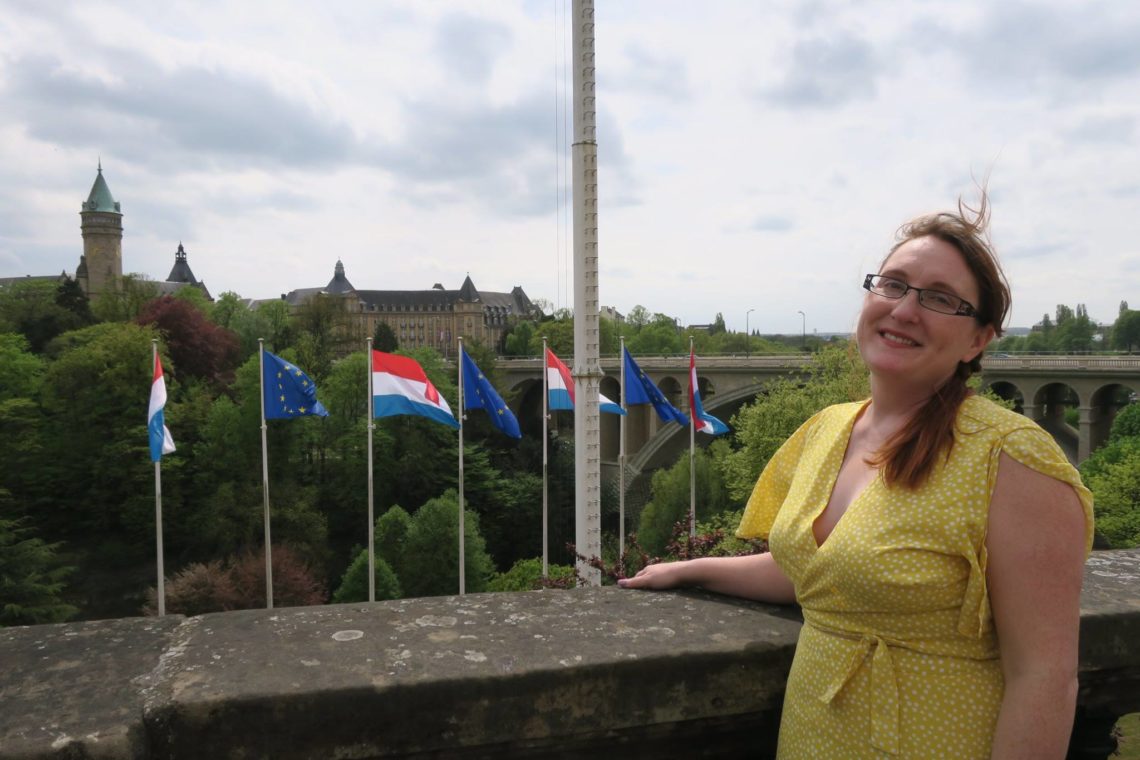Wait, what?
Luxembourg is a small country nestled amidst the countries of Belgium, Germany, and France. There are about 600,000 people in Luxembourg, and they sometimes speak Luxembourgish. Yes, that’s really a language. It is most closely related to German and Dutch.
At this point, because so few people speak this language, it is not really beneficial to use it in international business or other interactions. There are three main languages in Luxembourg: French, German, and Luxembourgish. My understanding is that Luxembourgish is spoken at home, elementary school is taught in French, and high school is taught in German. All government documents are in French, as we have had to have many things translated so far. But the rest of town is just a mixture. Walking through the Place d’Arms, half the restaurants had German menus and advertisements and half were in French. Rarely, something was in English. I didn’t know any Luxembourgish at the time, so I don’t know that I would have recognized it as distinct from any other language I don’t speak, so I can’t say how many things were written in Luxembourgish, but it wasn’t prevalent.
Logistics
I am now preparing to stay in Luxembourg for 4 weeks. The first week I am there, I will take the Luxembourgish language test, the Sproochentest. The test should take approximately 10-15 minutes, and consists of 2 parts. I must be able to look at a photograph of people and describe what they are doing and where they are and what is in the photo. And I must be able to discuss my life. There are 10 topics that the interviewer can ask me about, and I have to be able to describe my own life in relation to those topics. Describe my family; talk about what I do on vacation; expound on my hobbies…. and do all of that at the A2 level of the European Language assessment framework. Use enough varied vocabulary, complex enough sentence structure, adequate pronunciation, etc.
Honestly, it has been a long time since I have taken a test. Like… a long time. I am not, in general, a nervous test-taker, but for this event, the repercussions of failure are quite high. There is a 6 month wait to register for the test. I registered in May. They then, in their own time, assign you a date for your test. I was notified the last week of July of my test date. And the test must, of course, be taken in person in Luxembourg. So, if I fail, I have to re-register, wait another 6 months, and fly back, obviously at my own expense. This has pushed me to a state of near mental collapse for the last 2 months. I’m spending hours a day studying, walking around at all times mumbling to myself unintelligibly, staring into space completely frozen while mouthing strange words. Joe finds this incredibly creepy. Only 3 more weeks until the test.
In preparation for the test, I have taken some online classes, as well as using some online flashcards. There are really very few resources out there for learning Luxembourgish. And those that are available are quite expensive. For the last month, and up until the test, I have registered for a class with a 1-on-1 instructor. We do practice tests once or twice a week over Skype. This has been immensely helpful, as being forced to formulate sentences and speak is really what has gotten me over the hump of passively understanding Luxembourgish into actively speaking. My instructor is, however, in Luxembourg. So I’ve been taking these classes on Luxembourgish time. Sometimes I am lucky and my class time is 9 a.m. for me. A couple times, class was at 1 a.m. or 5 a.m. I am hoping the sacrifice of my sleep will pay off. At least I know that, if I’m jet-lagged, I can still speak …. sort of.
The language is so similar to German that I have a fairly easy time understanding it when it is spoken to me. And I have a great head start on the grammar and structure of the language. But… having the Luxembourgish word at the front of my mind (rather than thinking in English, then German, then Luxembourgish) is the key to speaking more fluidly. It has been fun to explore how the words change and see which Luxembourgish words are German and which ones are French. The grammar is 90% German grammar, but the words are, I would say 75% German, 25% French. And then there are super fun words that are French words…. like Client (pronounced in French as Kleee-ohn). But they take the French words and make them plural by the rules of German. So instead of Clients, you have Clienten. Which is a rather amusing thing to do to a French word with no consonants (or at least no consonant sound) at the end. So it is pronounced ‘klee-oh-en’, which is actually fun to say.
Fun Words
I hope to keep here a list of my favorite Luxembourgish words.
- Gromperekichelcher – this is the word for potato pancakes. I find it amusing for several reasons. First off, we’ll start with Gromper. Gromper means potato (Gromperen === potatoes). Where does this come from? In German and even Russian, potatoes are kartoffeln. In the Austrian dialect, they are Erdäpfel (earth-apples). In French, pommes or pommes de terre (apples of earth). And Spanish and English share the similar patatas, potatoes. So where does Gromper come from? No clue, but it’s a strange word. But then, to make it more fun, we add the pancakes part of it. Kichelcher. In Luxembourgish, all of the things that are guttural, back-of-the-throat sounds in German are now soft. So those ‘ch’s in kichelcher are pronounced as ‘sh’. So like kee-shell-sher. It’s a big, slurred, mouth-full. Suzie sells kichelcher by the sea shore.
- Cereal – I was discussing food as a topic last week and she asked what we eat in America for breakfast. I said that I don’t eat breakfast now, only drink coffee in the mornings, but as a child I ate…. oh, what’s the Luxembourgish word for cereal?…. müsli?* I posited. She said yes, that müsli is a thing in Luxembourg, but for general breakfast cereals, they say “a Kellogs”. This brings me great amusement as I ponder whether other languages think it funny that we say “Kleenex” instead of just tissue. –(*Müsli is like a granola, more often eaten with quark or yogurt than with milk, so it isn’t quite the same as cereal.)
- Plaid – One part of the test is to look at a photo of human people and describe them. This is a man, approximately 40 years old, wearing a green shirt and blue jeans. He has sunglasses. It sun must be shining. Maybe it’s summer…. etc. So imagine my dismay when my instructor pulled out a photo and boom: plaid. Now, I totally understand that dudes grilling hamburgers while wearing plaid shirts is the most quintessential way to express that it is Fall outside. At the same time, as a language learner, solid colors are obviously preferred. So I started describing this photo and I get to the shirts…. I tried “plaid”. She didn’t understand. I tried “tartan”. Nope. I do not speak enough German to even know what the German word for plaid is. And she doesn’t understand the English word for plaid. As it turns out, the word in Luxembourgish is karéiert. I don’t know it’s actual etymology, but I’m associating it with like, corrugated or scored. –> Update: In German, kariert means ‘checkered’. So… we might not even be talking about plaid specifically.






2 Comments
Laura K
This is awesome Tina, thanks for taking so much time to blog about your travels. Why are you taking this language test? Are you thinking of moving to Luxemburg?
Tina
We are considering it down the line at some point. Nothing concrete yet, but passing the test and the civics class makes it much more feasible as an option. 🙂 And I’m glad you’re enjoying reading it! I ramble a lot, but it’s fun to see new places.